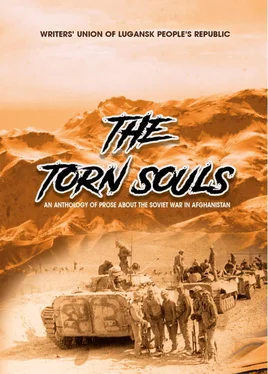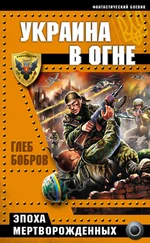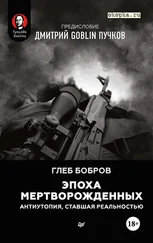The Fokker Scourge
Since dawn a pair of choppers were engaged in free hunting by searching the desert to the west of Shindand, near the Iranian border. Two helicopters have already been flying for two hours and landed whenever a senior officer from the Special Forces group requested. However, the hunting had no success — no cars, no camels, no enemy. There were only black tents of Pashtuns (see “Terminology and Glossary” — Editor) that from above looked like karakurt (see “Terminology and Glossary” — Editor).
When we did land again and our soldiers were searching the tents for the enemy, an on-board technician looked at the fuel indicator and noticed that there was just enough kerosene to get back to the “point”.
— Commander, it is time to return, — he said, pointing to the fuel gauge.
The commander popped out from his blister, called to a soldier standing nearby and shouted:
— Notify everyone — our fuel is running low!
The soldier nodded calmly, turned his face to the tents, and made the ordered notification to his comrades. He did it a very simple way — raised his gun and pulled the trigger. The string of bullets — almost a third of cartridges from his loaded gun! — went straight up into the sky. But because he was standing right under the rotating blades, all bullets went straight into the blades!
The chopper’s crew became speechless. The commander together with the board engineer F. pulled their hair in desperation, swearing something unreadable. They were punching the air towards the soldier; pointed at the head and twirling a finger at the temple (this gesture indicates craziness — Editor). The soldier looked at these strange actions of pilots, shrugged his shoulders and, with a confused look on his face, decided to move a few steps away from the chopper, just in case.
On the way home, everyone in the crew was listening to the whistling blades, looking closely at the edges of the screws — but everything seemed to be normal.
When they arrived and turned off the engines, two pilots together with the flight technician F. climbed up to the blades and searched for the damage but their careful examination showed that they do not have any holes!
— This soldier probably has a Fokker Scourge (see “Terminology and Glossary” — Editor) installed on his Kalashnikov! — the board engineer F. joked with a happy heart because it mean no need to change the blades.
— If this is the scenario, then it is okay — the commander grinned, — but what if (God forbid!) our Special Forces are using blank cartridges?
The Armored Barrel
The Chagcharansk’s flights continued to be harassingly dangerous, mainly because of a lack of adequate responses to cover the fuel overuse due to the alpine landscape.
One day the board No. 10 took the wounded ones from Chaghcharan town. When the chopper took off and climbed to the top of the ridge, heading towards Shindand, the flight engineer F. began assisting the doctor to set the drips — he tightened the tourniquets — or held the soldiers’ arms, trying to minimize vibration, so the doctor could inject the veins — and at this altitude the vibration was so hard that it resembles being in a racing cart. Soon the air loss at this high altitude started to affect two soldiers, who were wounded in the chest, and began turning blue, constantly choking, and blowing up pink bubbles.
But there was nothing that we could do at this height, and the commander decided to land his pair of helicopters to make sure that the wounded ones could survive until we reached a hospital… but at the landing spot, at the valleys near a river, the jihadist (see “Terminology and Glossary” — Editor) were already waiting for us. Spitting liquid fire to jihadist, we somehow got away. To avoid a risky landing again, it was decided to do landing one more time near the mountain range of Safed Koh, so the wounded will be breathing the air with their bloody mouths. And again, after descending from the pinnacle, after searching through the gully for a safe landing, they were shot at by Afghans from their “Boers” (see “Termonology and Glossary” — Editor).
When they got to a hospital, the wounded ones were alive, but this flight finally made the onboard technician F. very angry. For the next flight to the mountains, he prepared well: put on board two ordinary barrels and filled them with kerosene. The onboard technician of the main one 27, Lieutenant Mukhametshin, did the same thing. They both charged machine gun belts with more bullets and scored six rocket units each.
Now they were ready.
…The flight was a very slow one. They were roaming the valleys, looking behind every tree, teasing shepherds and farmers by faking their helplessness… and the bite was swallowed.
— We are being shot — the main helicopter suddenly reported. — It seems that they hit our tail. But we are still going…
The commander immediately directed the pair of choppers to fly along the river bed on the left, hiding behind the mountain. Enemies knew about our problems with the fuel, this is why they fired at the tail all the time. Usually, in such situations, helicopters flew away without looking back and the crews helplessly grind their teeth. But this time it was different.
— Now, I will show you, assholes! — and the commander turned the chopper for the attack.
They saw that a truck with the heavy machine gun stopped on the river bank, and three bearded men were stretching on the grass and laughing at cowardly shuravis (see “Terminology and Glossary” — Editor).
— The clouds go sullen on the border of my country… — the commander whispered a line from a well-known patriotic song and directed his helicopter higher, to the top of the mountain, and from there the two choppers, simultaneously, flew down on the heads of the bearded men — who did not expect such meanness, — they jumped up: one rushed to the cockpit, the other two climbed into their truck as soon as they have spotted two dragons falling from the sky. The flight engineer F. pressed a trigger with his fingers — nothing left after his gesture! — and a string of bullets ripped off the car door with tracers waving on the truck like snakes…
— And the samurai were falling down… — now the commander was shouting his favorite song, and, at the same time, pressing the trigger, —…under the pressure of steel and fire! — and he finished his song.
The truck flew up and fell back to the ground in the form of unrecognized metal and rubber precipitations that were burning. The smoke was rising up — a piercing black bubble against the background of the sugary white peaks.
— Even if someone survived — the commander said — we will not finish them. I am sure, they crapped in their pants and they will be remember the fear for the rest of their life. From now on they are just ordinary shit-asses…
For the rest of their way back, the crew was singing “On the border the clouds go sullen, silence enveloped the edge of the stern”, which they finished with the line “The crew of a battle machine!!!” with a special feeling and tears in their eyes from pride.
Despite the merry signing, the flight engenner F. kept sending long strings of bullets to the sloppy hills in all directions. To make sure, to make them heard and to be feared.
On arrival, it turned out that the leading helicopter was hit by the heavy machine gun with a mortal shell of 12.7 mm. The bullet pierced the back flap, ricocheted off to the opposite side, went through the empty kerosene barrels and lodged there, sticking out its smashed nose.
This kind of bullet (including those that were made in China) had a very powerful demolishing force. One such bullet went through the bottom of a helicopter, and passed all layers of parachutes, stopped at the bottom of a stool, where a navigator Senior lieutenant B. used to sit, touching his bum with its hot pointy nose. During the heat of battle he did not realize what had taken place, but on the ground, after discovering a sharp bump, Senior lieutenant realized what could of happened and he collapsed. Only a glass of vodka helped him to return to his senses. After suffering from such stress the repeat doses of a glass of vodka could never knock pilots down — but only alleviate them.
Читать дальше










